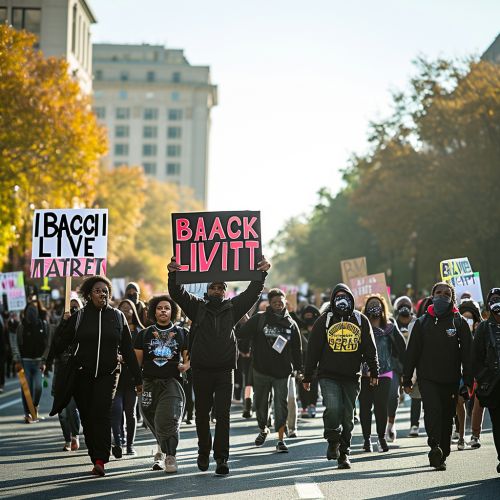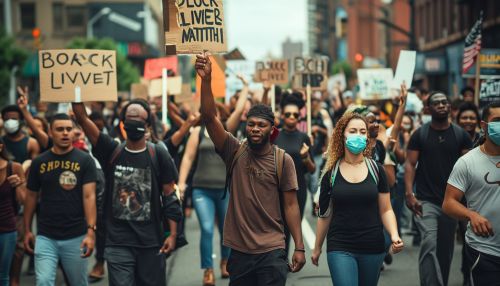Black Lives Matter
Origins and Background
The Black Lives Matter (BLM) movement originated in the United States in 2013, following the acquittal of Trayvon Martin's killer, George Zimmerman. The movement was founded by three black activists: Alicia Garza, Patrisse Cullors, and Opal Tometi, who were moved to action by Zimmerman's acquittal and the broader issues of racial inequality and police violence against black people in the United States. The phrase "Black Lives Matter" was first used in a Facebook post by Garza, and was subsequently spread on social media platforms, particularly Twitter, by Cullors and Tometi.


Ideology and Goals
The Black Lives Matter movement is a social movement advocating for the rights of black individuals worldwide. It aims to combat and counter acts of violence and systemic racism towards black communities. The movement's central belief is that all black lives matter, including those of black women, black queer and trans individuals, black disabled individuals, black undocumented individuals, and all black people who have been marginalized within black communities.
The movement's goals are to end violence and systemic racism, and to ensure the social, political, and economic equality of blacks. It seeks to bring about a world where black lives are no longer systematically and intentionally targeted for demise.
Tactics and Methods
The Black Lives Matter movement uses various tactics and methods to achieve its goals, including protests, civil disobedience, social media activism, and policy proposals. The movement has organized numerous protests in the United States and around the world, often in response to incidents of police violence against black individuals.
The movement also uses social media platforms to spread its message, mobilize participants, and coordinate actions. The hashtag #BlackLivesMatter has been widely used on social media platforms to raise awareness about the movement and its goals.
Impact and Influence
The Black Lives Matter movement has had a significant impact on American society and politics, and has influenced discussions about race, police violence, and criminal justice reform in the United States and around the world. The movement has brought attention to issues of systemic racism and police violence, and has influenced the development of policies aimed at reforming the criminal justice system and reducing police violence.
The movement has also influenced popular culture, with references to Black Lives Matter appearing in music, film, and other forms of media. The movement has been recognized with numerous awards and honors for its work in promoting social justice and equality.
Criticism and Controversy
The Black Lives Matter movement has faced criticism and controversy from various quarters. Some critics argue that the movement's focus on black lives implies that other lives do not matter, a claim that the movement's founders and supporters reject. Other critics accuse the movement of promoting violence or hatred against police officers, a claim that the movement also rejects.
The movement has also faced controversy over its tactics and methods, with some critics arguing that the movement's protests and demonstrations are disruptive or counterproductive. Despite these criticisms, the movement continues to play a significant role in discussions about race, police violence, and social justice in the United States and around the world.
